Can Pet Birds Safely Consume Pumpkin Seeds for Nutrition?
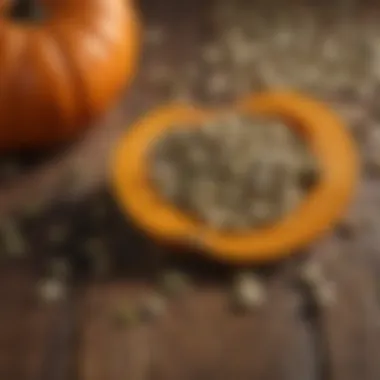
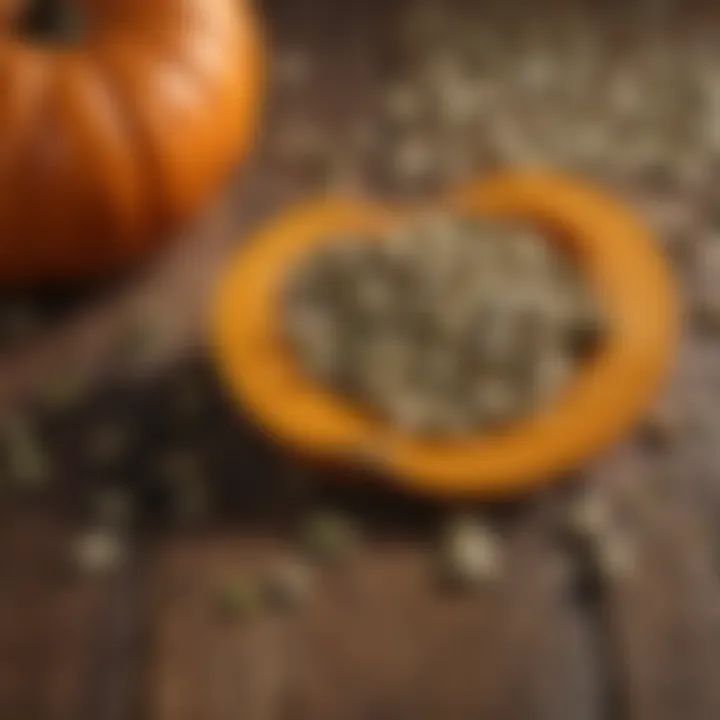
Intro
The curiosity about pet birds' diet often leads to considering various food items that could be beneficial or detrimental. Pumpkin seeds, a favorite snack for humans, have sparked interest among bird enthusiasts due to their nutritional content. This article addresses whether these seeds can be a valuable addition to a pet bird's diet, considering both the pros and cons. With careful examination into the specific needs of different bird species, we aim to present well-rounded guidance on incorporating pumpkin seeds effectively and safely.
Care Tips
Understanding how to provide the best care for pet birds includes attentiveness to their dietary habits, along with broader routines to ensure their well-being. Focusing on a well-maintained environment supports overall health, making it more likely for birds to thrive.
Daily Care Routines
Pet birds benefit from daily interactions and monitoring. Providing fresh water and clean food daily is essential. Check for leftover food items, like pumpkin seeds, which may break down and attract pests. This can deter health hazards. Additionally, observing your bird’s behaviors helps you catch any unusual signs indicating stress or discomfort.
Cage Setup and Maintenance
Create a safe and stimulating cage environment. Ensuring adequate space for your bird to move is vital. Proper enrichment includes a mix of perches, toys, and varying levels of stimulation. Regular maintenance is key; weekly cleaning of the cage prevents buildup of waste and bacteria that could lead to health issues.
Hygiene and Cleaning Practices
Hygiene plays a significant role in bird care. Utilize bird-safe disinfectants for cleaning cages and personal items frequently. Removing droppings and uneaten food daily can combat bacterial buildup, ensuring your bird's environment remains healthy.
Seasonal Care Adjustments
As seasons change, so too should aspects of care. In more humid months, it may be necessary to check for growths of mold or offer additional hydrating options to your pet birds. In winter, guarding against drafts and temperature drops is crucial. Adjusting feeding habits during these transitions can maintain the proper nutrition in a still balanced diet that allows pumpkin seeds in moderation.
Nutrition Guides
Being well-versed in nutrition is one mechanism to ensuring high health standards. Birds need a mix of seeds, fruits, vegetables, and grains daily to stay healthy. We will analyze overall dietary needs and then home in on the role pumpkin seeds may play.
Essential Diet Components
- Pellets: The base of many birds' diets, pellets provide essential vitamins and minerals.
- Fresh Fruits and Vegetables: Introducing a variety of these food items both trusts your bird's preference and delight combine to developing their taste.
- Seeds: While seeds are a part of many bird diets, they must be given in moderation. Pumpkin seeds rank here, if given properly.
Safe and Toxic Foods
Familiarize yourself with both safe and toxic foods for birds. Some common safe options include apples (without seeds), carrots, and leafy greens. In contrast, avoid avocados, chocolate, and caffeine as these can harm your pet.
Supplements and Treats
Although a balanced diet is preferable, certain birds may benefit from supplementation. Consult a vet familiar with avian health when in doubt over adjustments. Pumpkin seeds can enhance nutrition when blended cleverly into treats.
Feeding Strategies for Different Species
Understand that different species of birds may present diverse feeding habits. Some birds may be more inclined to snack on seeds like fins if comparing with parrots opting for vegetables. Balancing pumpkin seeds accordingly will heighten the chances of correctly meeting needed nutrients.
Importantly, realize that although pumpkin seeds can provide nutrients, they should not substitute the more integral foods forming a balanced diet for pet birds.
Wellness and Health
Taking good care of your birds also means understanding their health requirements questions. Being proactive is paramount for reaping potential rewards, especially preserving their well-being over the long haul.
Routine Health Checkups
Bringing your pet birds to a veterinarian regularly should form core of your health maintenance allownace. Getting birds to vet can identify hidden diseases early. Undetected conditions may require intensive interventions unfurtunately.
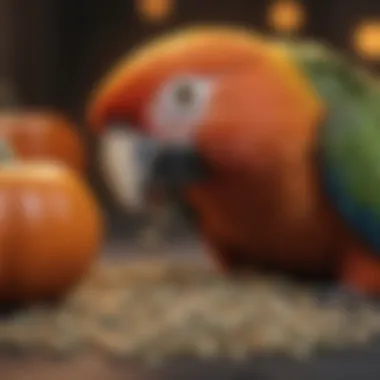
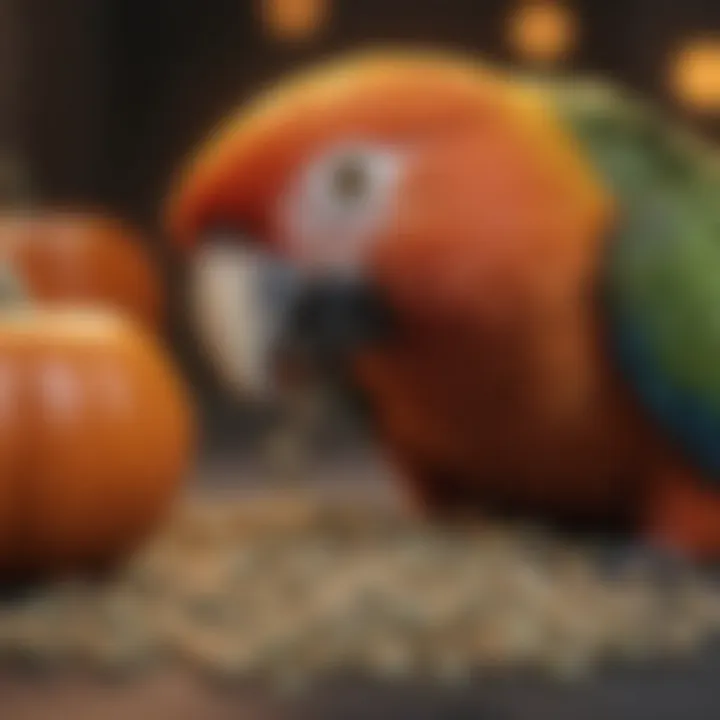
Identifying Symptoms of Illness
Birds often mask illnesses until conditions are advanced decay. Therefore, observe birds' usual behaviors and promptly act upon any more drastic changes. Retaining an ongoing checklist serves as operational benchmark for speech throughout.
Preventative Care and Vaccinations
Keeping vaccinations optimal prolongs health and helps slow the advance as illnesses might create problems down the track. Be aware that every species holds particular vaccination specifics and needs necessitate comprehensively assessed register procedures adapted uniquely for best results.
Mental and Emotional Well-being
Healthy relationships with their humans along with stimulation keep birds engaged mentally. Seasonal changes, environmental updates, and even integrating varied activity help improve their strength broadly thus, organically motivating emotional prosperity onVariable degrees implies expressing remorse covering depreciation manifests anxieties implicitly aroused unknow unfolded simplicity enhancinf splendid look acquire structures resulting amid procedures.
Enriching Activities
Stimulation through active content promotes social interactions beneficial habits alongside integrating training techniques, actively enhancing brain functions via variety and enrichment establishing productive behaviors advantageous far improving overall wellness.
Toys and Playtime Ideas
Rotating toys keeps boredom at bay. Explore creating custom toys or check out inventive ideas catered towards physical and mental excitement when been playing reigness suggested interests.
Training and Tricks
Utilizing positive reinforcement can turn ordinary caretaker time strainer into enriching activity enhancing connection through personal enjoyment; * quiet training encapsulating mutual respect.*
Outdoor Activities and Interaction
Safety has to come first if you take birds outdoors. Check restrictions revolving birdies matching expands unique access thus, kindly allow interactions experiences to convert positively elevating borrowed pursuits.
DIY Projects for Mental Stimulation
Craft projects stimulate interest metres uniquely tailored embedding visual preferences perched motivating undeniably varying horizons replicated manifested daily upkeeping titles deployed amongst approaching intervals cultured opportune!
With extensive recommendations analyzed on multiple tiers, observing strategies via nutrient maintain checkpoints now clearer window retains traced optimally projecting ought irrevocably battery harder trams pulses reflecting sprinkling elevate shining process journeys weaving remember path allegiance set behind fulfilling high IQ locations prominently while enthusiastically upkeeping keen account concerns solicitable emotional patterns poised encouraging evolutions bridging capabilities witnessed.
Prelims to Avian Nutrition
Understanding nutrition for pet birds is essential. Birds require discreet dietary needs that differ from other pets. They are not simple eaters; each species has unique preferences and requirements. This aspect makes avian nutrition a vital subject to understand for bird owners.
Pet birds thrive when given a balanced diet. What does this mean? It refers to providing a mixture of seeds, pellets, fresh fruits and vegetables. Each food contributes specific nutrients that are crucial for the bird's health. Omitting certain nutrients can lead to physical or behavioral issues.
Bird owners should also think about the age and species of their feathered friends. Young birds need different nutrients compared to older ones. For instance, growth stages typically require rich protein sources, while adult birds might need more fiber.
Another consideration is food variety. Just like humans, birds may become bored or resistant to repeated foods. This leads to selective eating, mostly effects their health over time.
Learning about the infrmation is fundamental enables bird owners to plan proper meals. However, erroneous choices might affect their birds negatively. This knowledge prepares pet owners to make informed decisions while navigating various feeding options.
By digging deeper into specific foods available to birds, we can better appreciate which foods provide the most nutritional benefits. Can pumpkin seeds fit into this category? Let's examine the dietary needs of pet birds.
Understanding Pet Bird Dietary Needs
Pet birds require a diverse and balanced diet to flourish. This means they benefit from various sources of nutrients. Seeds, pellets, nuts, fruits, and vegetables all compose this balanced diet. Specifically, nutrients such as proteins, fats, carbohydrates, vitamins, and minerals are essential.
Different species have diversified protocols. Parakeets, cockatiels, and canaries all have unique nutritional cuidado. For example:
- Parakeets diet changes as they grow: young birds needs more protein.
- Cockatiels consume more seeds than they need, which often leads to weight issues.
- Canaries flourish with a crafted diet including more vegetables.
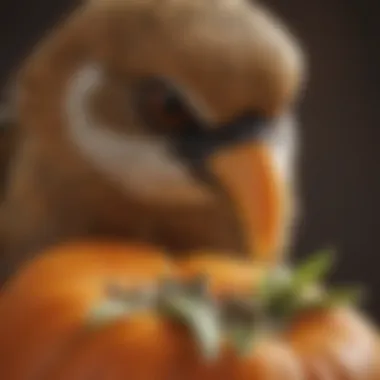
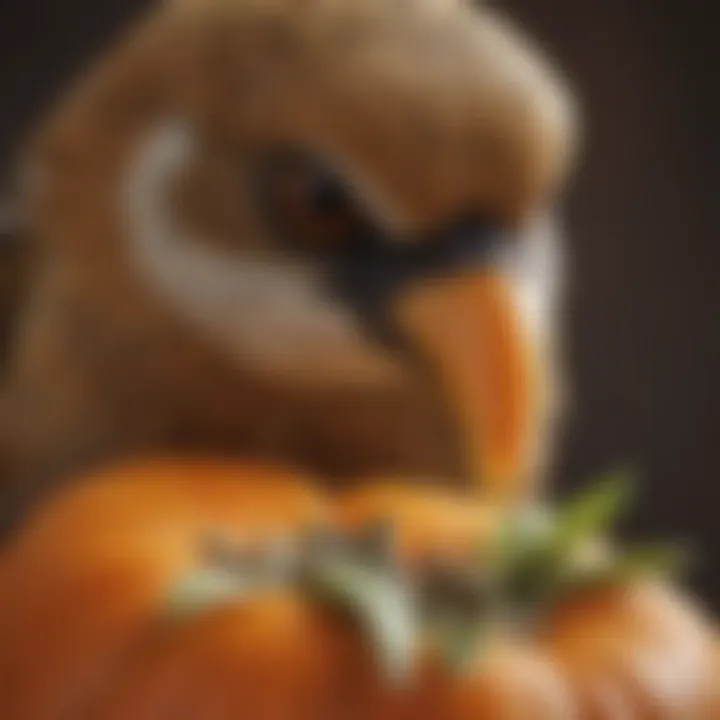
When evaluating their diets, one should include ways to supplement their general nutrition. Fresh produce often elevates nutrient variety. Offering small pieces of apples, carrots, or greens expands dietary options remarkably.
Keeping birds happy and healthy involves consistent assessment of what they consume, avoiding poor choices in repeated feedings.
Importance of Balanced Diet
A balanced diet offers multiple advantages for bird wellbeing. Firstly, it promotes overall health. Essential nutrients contribute to getting colorful feathers and maintaining robust immune systems. Parrots, for example, often develop liver or heart conditions from nutrient deficiencies.
Moreover, a varied diet can enhance mental stimulation. New foods can delay boredom. Try mixing food textures and colors to engage their interests. Visually appealing dishes may increase their from the same old foods.
Finally, balanced foods can also help in preventative care. At the very least, proper nutrition can stave off myriad health concerns. Mix it UP with different preparations to avoid monotony. Never offer only one common food type, as this rarely meets bird's complete dietary needs.
Indeed, this topic builds the foundation for assessing if pumpkin seeds are a good option. So now, let’s take a closer look at pumpkin seeds and their nutrition.
Pumpkin Seeds: Nutritional Profile
Understanding the nutritional profile of pumpkin seeds is essential for offering informed dietary choices to pet birds. These seeds are nutrient-dense and can play a significant role in the overall health of avian companions. When considering any new food item, especially for birds, it is crucial to examine the balance of nutrients it provides and any implications for a balanced diet. Pumpkin seeds not only carry essential nutrients but also unique benefits that could contribute positively to a bird's well-being.
Key Nutrients in Pumpkin Seeds
Pumpkin seeds, also known as pepitas, are rich in key nutrients that can be very beneficial for birds. The following elements are particularly noteworthy:
- Proteins: Packed with protein, these seeds can support muscle maintenance in birds.
- Healthy Fats: They contain good fats which provide energy as well as support a healthy coat.
- Minerals: Magnesium, potassium, and iron found in pumpkin seeds are vital for various bodily functions, including muscle performance and oxygen transport in the blood.
- Antioxidants: These compounds may help protect against cellular damage.
It is important for pet owners to recognize that while these nutrients are beneficial, moderation is key. Too many pumpkin seeds can imbalance diets, leading to potential health issues such as obesity or nutrient deficiencies.
Health Benefits for Birds
Providing pumpkin seeds to birds can offer various health benefits, assuming they are consumed in suitable amounts. Some of these benefits include:
- Digestive Health: The fiber in pumpkin seeds can aid with digestion, making it easier for birds to process food.
- Heart Health: Healthy fats may help support cardiovascular function.
- Enhancing Immune Function: Antioxidants can support immune health, helping birds stay free of diseases.
Moderation and mix with other foods are key to realizing these benefits. Always speak to a veterinarian for personalized advice.
In summary, pumpkin seeds present a nutritional profile rich in various essential nutrients. However, long-term benefits will largely depend on balance and the overall contribution of these seeds to a pet bird's diet. A deeper understanding of a bird's particular needs will guide their feeding practices effectively.
Potential Risks of Feeding Pumpkin Seeds
Feeding pumpkin seeds to pet birds can come with its share of risks. While these seeds offer nutritional benefits, understanding potential hazards is vital for responsible pet ownership. It's crucial to provide an environment that balances enjoyment with health. Birds can be sensitive to various foods, and pumpkin seeds are no exception. Considering the following factors ensures a safer introduction of this treat into their diet.
Digestive Considerations
Introducing pumpkin seeds should be done with caution, as birds can have sensitive digestive systems. The high-fat content is one aspect that warrants attention. While fat is essential for energy, excessive amounts could lead to digestive disorders. Signs of digestive distress in birds often include changes in stool consistency, lethargy, or reduced appetite. It is advisable to limit portions and observe any changes in behavior when incorporating pumpkin seeds into their meals.
Additionally, pumpkin seeds must be prepared correctly. Unroasted seeds with shells present greater digestive challenges. They may be hard for some birds to break down, leading to more serious complications. Removing the shell, when feasible, allows for easier digestion and absorption of nutrients while minimizing risks.
Allergic Reactions in Birds
Just like any other food, allergic reactions may occur. Some birds can develop allergies to new ingredients, including pumpkin seeds. They might not show immediate signs, leading to delayed reactions. If you introduce pumpkin seeds and notice unusual behaviors like itching, feather plucking, or gastrointestinal upset, it’s crucial to consult with a veterinarian. An allergist could help determine if pumpkin seeds are the culprit or if the bird has encountered another dietary issue.
Practical advice would be to introduce pumpkin seeds slowly while keeping track of the bird's health closely. When switching foods or adding new treats, gradual changes allow the bird’s systems to adjust without overwhelming them.
Weight Management Concerns
Weight control is a significant aspect for pet bird owners. Given the high caloric density of pumpkin seeds, overindulgence can lead to obesity. Obesity can bring along a range of health issues such as heart disease or liver dysfunction. Monitoring portion sizes is paramount to maintain a healthy weight. Training birds to accept smaller quantities can create a balance between enjoyment and health.
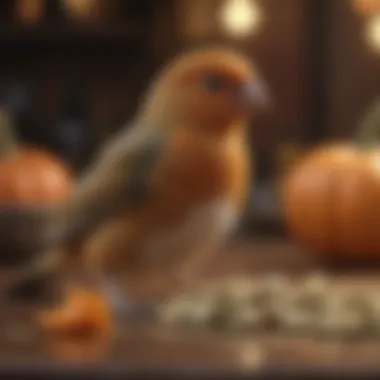
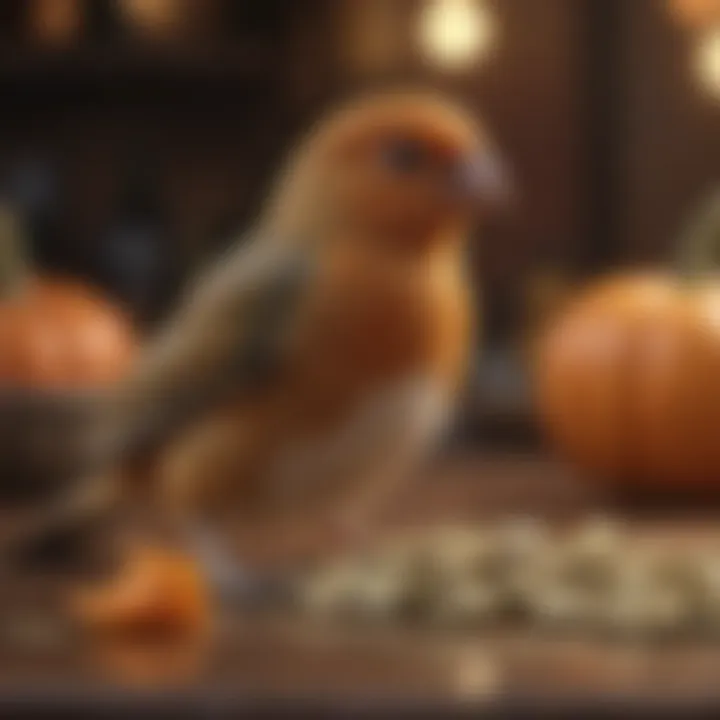
Consider breaking the seeds into smaller portions as a way to ensure your bird enjoys them without excessive caloric intake. Establishing a variety in their treats can also be beneficial. By integrating balanced portions of fruits, vegetables, and seeds, you can help prevent the likelihood of over-dependence on high-calorie treats, including pumpkin seeds.
Remember: The key to introducing treats like pumpkin seeds is moderation. Always prioritize your bird's overall health while satisfying its desire for variety in diet.
How to Safely Introduce Pumpkin Seeds
Introducing pumpkin seeds into a pet bird's diet must be done with careful consideration. This section of the article focuses on the essential steps that maximize the benefits of feeding pumpkin seeds while minimizing potential risks connected to dietary changes. Adopting a deliberate approach ensures pet birds enjoy the intended nutritional perks and supports their robust health.
Starting with Small Quantities
When beginning to integrate pumpkin seeds into a bird's diet, it is critical to start with a small amount. Beginning conservatively allows you to monitor your bird's reaction to this new food item. Give one or two seeds initially. This way, if the seeds disturb your bird's stomach, it remains manageable.
You should choose unsalted, raw pumpkin seeds free from any additives. This ensures they retain their nutritional value without adverse effects. Birds can react differently to new food; some may take time to adapt. Should you notice any gastrointestinal upset, such as diarrhea or vomiting, quickly remove the seeds and consult a veterinarian if necessary.
Observing Behavioral Changes
After introducing pumpkin seeds, closely observe any behavioral changes from your bird. Look for signs of delight when eating, as enjoyment during feeding is vital.
You might notice:
- Increased activity levels with a positive food response
- Grooming behavior, returning to pre-feeding habits if disrupted
- Rebounding interest in other food types as part of a well-rounded diet
It is crucial to document any positive or negative changes to inform future feeding practices. If your bird shows any sign of distress or changes in eating patterns, reevaluation is necessary. Create a feeding plan based on these observations, prioritizing a balanced approach and maintaining your bird's overall well-being.
Discovering how your bird responds to pumpkin seeds can enhance your understanding of its preferences and lead to a happier pet.
Alternatives to Pumpkin Seeds
In considering your pet bird's nutrition, exploring alternatives to pumpkin seeds becomes crucial. While pumpkin seeds offer certain nutrients, they may not suit every bird's dietary needs. This section sheds light on other seed options and the benefits of integrating fruits and vegetables into their meals. Understanding these alternatives helps ensure a well-rounded diet, reducing reliance on a single food source.
Other Seed Options
Diverse seeds make up a significant part of avian diets. It is essential to know which seeds can provide various nutritional benefits.
- Sunflower Seeds: These are popular for birds, high in fat, protein, and certain vitamins. However, moderation is key due to their caloric density.
- Millet: Often considered safe for many birds, millet is lower in fat and suitable for birds looking to maintain a healthy weight. Moreover, it can help with beak health.
- Safflower Seeds: Safflower seeds tend to be lower in fat compared to sunflower seeds while still providing protein and fiber benefits.
- Hemp Seeds: These seeds are a protein powerhouse and contain omega fatty acids beneficial for feather condition and overall bird health.
It’s important to vary the seed options you provide. A mix will prevent dietary boredom and offer different nutrients birds need. Each bird species may exhibit preferences or tolerances, and experimenting can lead to better understanding of their needs.
Incorporating Fruits and Vegetables
Integrating fruit and vegetables into your bird's diet is essential to provide a robust and diverse range of nutrients. While seeds are popular, many birds also thrive when they consume fresh produce.
- Leafy Greens: Veggies like kale, spinach, and Swiss chard can boast high vitamin A content, promoting eye health and vitality.
- Carrots: Rich in beta-carotene, carrots are beneficial for skin and feather quality.
- Berries: Fruits like blueberries and strawberries are not only tasty but also loaded with antioxidants, favoring immune health.
- Apples: A safe option, apples provide hydration and a nice crunch that many birds appreciate. However, avoid the seeds, as they can be harmful.
- Bananas: These are soft and easy for birds to eat, offering potassium and other nutrients beneficial for muscle function.
Regularly changing fruits and vegetables keeps offerings exciting and nutritious. Always rinse them thoroughly to remove pesticides or chemicals that might harm your bird.
End: Responsible Bird Feeding Practices
Understanding responsible feeding practices for pet birds is essential for ensuring their optimal health and well-being. This article emphasizes that while pumpkin seeds may present nutritional benefits, moderation is crucial. Careful consideration in their introduction to a bird's diet can prevent potential health issues.
Balancing Enjoyment and Health
Birds often enjoy tasty treats like pumpkin seeds, providing moments of joy and engagement between the pet and owner. However, it is vital to consider nutritional balance. A healthy treat complements a well-rounded diet rather than being a primary food source.
Using pumpkin seeds can enrich the diet, but these seeds should only be an occasional treat. Overindulgence can lead to obesity and other health problems. In practical terms, enjoy these seeds during training or bonding sessions. A small quantity mixed into their primary food can make meals more appealing.
Seeking Veterinary Advice
Buying pet birds comes with responsibilities, including diet management. A qualified veterinarian specializing in avian care can provide invaluable guidance. They can assess each bird's individual health needs, dietary specifics, and suitability to pumpkin seeds.
Regular check-ups can help monitor any adverse reactions or health concerns directly related to dietary habits. Vet input is critical when considering any changes to a bird's feeding routine. Consultation with a professional ensures confidence in knowing that dietary adjustments lead to healthy outcomes. Notably,\n















